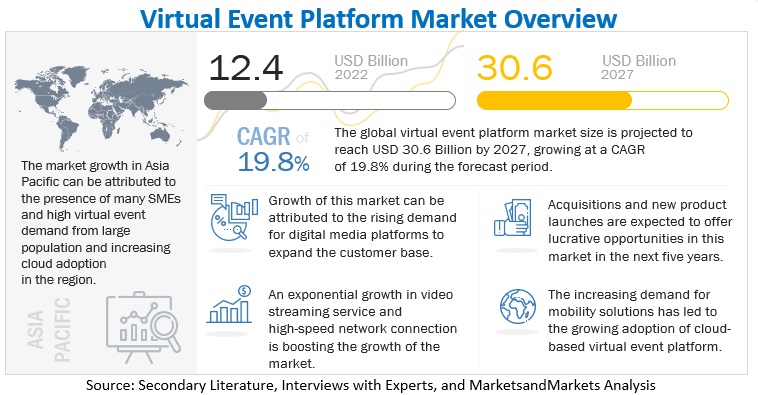What strikes your mind when it comes to organizing an event?
It’s choosing the best virtual event platform right. But how can you find the one before knowing about the same? There are lots of event management and ticketing systems that streamline your process.
However choosing the one that meets all your requirements is more challenging than eating a cupcake, there is a lot to consider while searching for the best virtual event platform for 2025.
If you’re looking for an event platform, this blog is only for you, read it carefully to find the list and comparison between the top virtual event platforms.
Market Growth of the Virtual Event Platforms
The pandemic has increased the need for organizing events online. LinkedIn study shows that 45% of B2B events were virtual pre-pandemic. More than 88% of event organizers arrange virtual events including webinars and online talks.
A report by MarketsAndMarkets shows that the virtual event platform is expected to grow by 19.8% CAGR between 2022 and 2027. The market is projected to reach from 12.4 billion to 30.6 billion during the forecasted period.

There are a lot of factors that result in virtual event market growth, including digital media marketing, an increase in corporate events, technology advancement, and more.
List of 10 Best Virtual Event Platforms
The continuous rise in event management platform development has resulted in lots of virtual event platforms in the market these days. Multiple options make it confusing for you to know which is the best virtual event platform to select from. To help you out we’ve listed the top 10 virtual event platforms that you can consider.
1. vFairs
No matter whether you’re looking to host a virtual, hybrid, or in-person event, vFairs is a great option to go with. It helps you organize any size of an event without hassle. It consists of all tools that help you achieve your objectives. The platform has an enterprise suit that helps to capture leads, generate revenue, and more with ease.
Be you are organizing a face-to-face conference, or running an in-person job fair, vFairs makes it easier for you to do that with simple clicks. The event platform has a user-friendly and easy-to-navigate interface that ensures to enhance your experience.
Pros:
- Customizable Virtual Spaces: Allows for detailed customization of event spaces, making each event unique.
- Wide Range of Features: Supports virtual booths, webinars, chat, and networking areas.
- Strong Customer Support: Known for its responsive and helpful support team.
- Engagement Tools: Includes gamification features and interactive tools to boost attendee engagement.
Cons:
- Complex Setup: The extensive customization options can lead to a steeper learning curve.
- Cost: Can be more expensive compared to some other platforms, particularly for smaller events.
Pricing:
Pricing is custom and depends on the specific needs of the event. Typically, costs start around $8,000 for a comprehensive virtual event package.
2. BigMarker
Provide a great event experience to your attendees by organizing any size of event with BigMaker. Robust webinar solution comes with marketing tools increasing your chance to be in front of more and more attendees and engaging them to attain your hosted event.
Use the automated email feature to send text to your targeted attendees. BigMaker also provides you with customizable webinar rooms and screen-sharing options, making it easier for you to provide a personalized experience.
Pros:
- Easy Customization: Offers extensive customization options for webinars and virtual events.
- Easy Marketing Campaign: You’re provided with email campaigns and event analytics helping you track the performance of your event.
- Scalability: Can handle large-scale events with thousands of attendees.
- Amazing Features: Interaction with your attendees becomes easier with BigMaker as it provides you with engagement tools.
Cons:
- If you are new to BigMaker, you can find it a bit complex.
- For a small business, the price sounds a bit high.
Pricing:
You need to talk with the support team to know the pricing. Once you specify your virtual event requirements the team will provide you with the quotes.
3. Hubilo
Looking to host Webinars with customizable options, Hubilo is the right choice to make. This platform enhances the virtual event experience by enabling event participants to be involved in interaction in real-time. Event participants can share their opinions or suggestions about the shared content, ensuring improved collaboration with them.
Pros:
- Hubilo provides lots of event management features that help you engage your audience, build connections, and track the performance of your hosted event.
- Both event organizers and attendees can use the platform without any hassle.
- Helps you build connections with your attendees with AI-powered matchmaking.
- Get your problem solved around the clock without hassle.
Cons:
- This can be expensive, especially for small event organizers.
- There are restricted integrations with some third-party tools.
Pricing:
- Enhanced Webinar Solutions Starting at $7,499/year
- Webinar Multiply Starting at $12,499/year
4. Goldcast
One of the best B2B marketing AI-powered video campaign platforms, Goldcast is a great choice when you’re looking to boost brand awareness and engage more audiences with attractive videos, events, and more. Goldcast makes it easier for your team to create engaging video content, webinars, and more for effective audience engagement.
Pros:
- This video campaign solution helps you host high-quality streaming to provide an improved experience to your users.
- Feature-rich platform makes it straightforward for you to host live chats and other real-time interactions.
- You can have a look at your event performance and participants’ behavior with analytics.
- Goldcast empowers you to make changes to event pages to give a unique touch to each event you organize.
Cons:
- Newbies can find the platform complex.
Pricing:
- Content Lab (Content only) Starts at $30 per user/month
- Price typically depends on the scale and features required.
5. Hopin
Wondering how to build experience? Don’t look further than Hopin. It is a video teleconferencing online conference-hosting platform that helps you build community and audience engagement. This audience engagement tool comes with three suits including:
- StreamYard,
- Streamable, and
- Superwave (beta).
Hopin engagement tools help you reach a global audience and build authenticated connections with your targeted audience. The video technology and live engagement features help you deliver and convey event participants in real time.
Pros:
- All-In-One Platform: Combines streaming, networking, expo areas, and more into a single platform.
- Scalability: Can handle events of various sizes, from small meetups to large conferences.
- Interactive Features: Includes chat, polls, and breakout sessions to engage attendees.
- Integration: Integrates with various tools like Slack, Mailchimp, and more.
Cons:
- Complexity: The wide range of features can be overwhelming for new users.
- Cost: Can be pricey, especially for smaller events.
Pricing:
- Starting price: $99/month.
- Basic: ₹1,499/mo
- Professional: ₹2,899/mo
The pricing can increase depending on your event needs.
6. GoToWebinar
Manage webinars hassle-free with GoToWebinar – the platform that makes event management easier. The platform has everything that you need to organize virtual events. You can manage webinars with a few clicks, it even helps you to rack leads. It also helps you to create custom registration forms and quizzes to capture the event details.
Pros:
- GoToWebinar helps you to find out the stability and reliability during live events.
- The easy-to-use interface helps to use and set up the webinars and virtual events with ease.
- It is easy to survey the event participants’ interaction with the engagement tools that this platform offers.
- The easy-to-use platform offers detailed reports on attendee engagement and event performance.
Cons:
- Limited Customization: Less flexible in terms of customization compared to some other platforms.
- Cost: Pricing can be high, particularly for larger audiences.
Pricing:
- Lite: €55 /organizer /month, billed annually (250 Participants)
- Standard: €129 /organizer /month, billed annually (500 Participants)
- Pro: €249 /organizer /month, billed annually (1,000 Participants)
- Enterprise: €409 /organizer /month, billed annually (Up to 3,000 Participants)
7. Accelevents
The event management platform makes it easier for you to create, manage, and track your event performance. The virtual event app consists of all features and functionality and meets all your requirements. Be it organizing in-person, webinars, trade shows, or conferences, Accelevents makes organizing everything easier for you.
Pros:
- Accelevents offers live streaming and event ticketing in one solution.
- Straightforward interface.
- Cost-effective option.
Cons:
- Limited options for branding and customization of event pages.
- Fewer integrations with third-party tools compared to some competitors.
Pricing:
- Professional: Starting from $5,000 (best for hosting a single event)
- Business: Starting from $12,000 (best for growing organizations with multiple events)
- Enterprise (custom): Contact the sales team (best for operating events across various departments)
- White label (custom): Contact the sales team (when your brand needs to shine)
8. Airmeet
Airmeet is a platform for virtual summits, meetups & workshops with a social lounge to deliver a rich networking experience. The platform streamlines event advertising. Airmeet AI-driven customization and content recommendations make the promotion easier, ensuring more attendee engagement.
Pros:
- Offers virtual tables and networking lounges to facilitate interaction.
- User-friendly interface that’s easy for both organizers and attendees.
- Suitable for various types of events, from small meetups to large conferences.
Cons:
- Some features may require a bit of learning to use effectively.
- Limited integration options with some third-party tools.
Pricing:
- Premium Webinars: Starts at $167 (Webinars that perform big on engagement and ROI).
- Virtual and Managed Events: Talk with the sales team to get quotes.
9. Webex Events
AI-driven collaboration and improved experience with Webex Events. The platform helps you to create and manage virtual, in-person, and hybrid events. Brands can complete the registration within minutes. You can set multiple ticket types, QR codes, ticket types, and more.
Pros:
- Known for its strong security features, making it suitable for professional events.
- Offers a wide range of features for webinars, virtual events, and hybrid events.
- Can handle large-scale events with thousands of attendees.
Cons:
- The interface can be somewhat complicated for new users.
- Can be expensive, particularly for larger events.
Pricing:
Pricing starts at $13.50/month per host for the basic plan. Custom pricing is available for larger events and enterprise solutions.
10. Livestorm
Livestorm is an all-in-one video platform to create and manage webinars, conferences, and other virtual events. This platform empowers your team to create and manage events in minutes. You can create a unique event that helps you represent your brand vision to your targeted audience.
Pros:
- User-friendly interface that’s easy to set up and navigate.
- Provides detailed analytics to track attendee engagement and event performance.
Cons:
- Customization Limitations: Less flexible in terms of customization compared to some other platforms.
- Feature Set: This may lack some advanced features needed for very large or complex events.
Pricing:
- Pro: $499 /month Billed annually (1000 active contacts)
- Business: Advanced features & VIP support (From 500+ active contacts/mo)
- Enterprise: Premium features, add-ons & dedicated CSM (From 500+ active contacts/mo)
Which Platform to Select from the Top List of Virtual Platforms?
Virtual event platforms provide a diverse array of options tailored to meet various event organizers’ needs. Each platform, from vFairs, BigMarker, Hubilo, and Hopin, offers unique strengths in terms. While some platforms excel in high-quality streaming and interactive features like Goldcast and Airmeet, others such as GoToWebinar and Webex Events prioritize reliability, security, and comprehensive event management capabilities.
Choosing the right virtual event platform depends largely on specific event requirements, budget considerations, and desired features such as networking capabilities, analytics, and integration with third-party tools. Event organizers seeking robust customization and engagement may opt for platforms like BigMarker or Hopin, while those prioritizing simplicity and reliability might prefer GoToWebinar or Webex Events.
Ultimately, evaluating these platforms based on their pros, cons, pricing structures, and key features will help organizers make informed decisions to create successful and engaging virtual events tailored to their unique audience and objectives.


